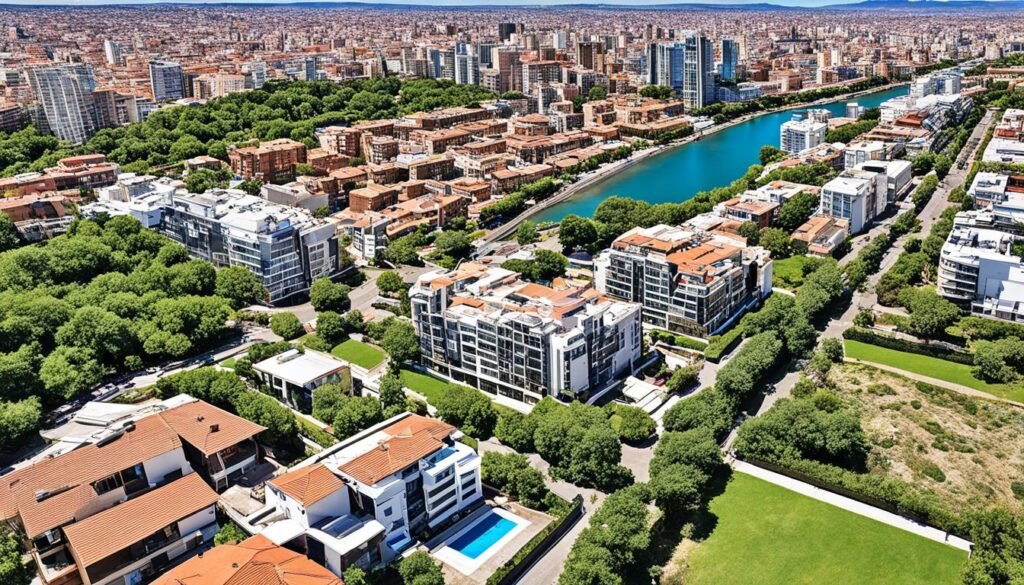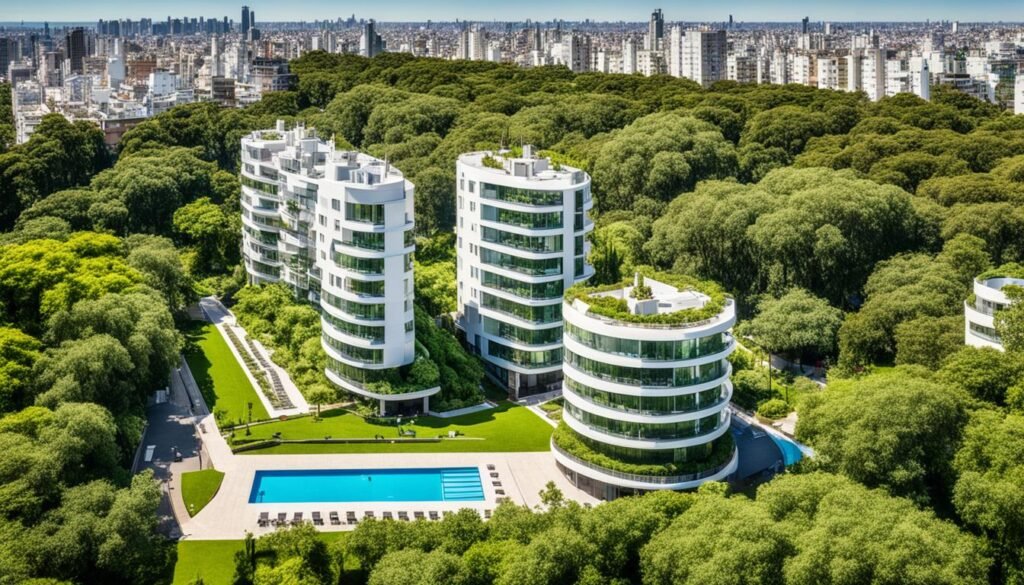As US buyer interest pivots towards Latin America, financing property in Argentina emerges as a compelling topic for those looking to invest or settle abroad. With its vibrant culture and diverse landscape, Argentina offers a unique market for property investment financing. However, navigating the intricacies of mortgage options in Argentina requires a solid understanding of not only the available real estate loans Argentina has to offer but also the specific requirements that come with being an international buyer1.
Key Takeaways
- Discover the unique investment opportunities in Argentina’s real estate market.
- Learn the fundamentals of property financing specific to US buyers in Argentina.
- Understand the variety of financing options available, including bank mortgages and developer financing strategies.
- Gain insight into the nuances of international mortgage terms and the importance of local regulations.
- Explore the potential challenges and solutions for securing a loan without a regional credit history.
- Consider the impact of exchange rates and local fees on the total cost of your property investment.
- Stay informed about the legal landscape and its effects on property purchases by foreigners.
Understanding Property Ownership Laws for US Citizens in Argentina
For US citizens looking to invest in Argentine real estate, grasping the nuances of local property ownership laws is crucial for ensuring a smooth and legally compliant transaction. As the country continues to emerge as a significant economic player, being Latin America’s second-largest country by area and its third-largest economy2, the opportunities for property investment are expansive.
Right to Own: Equating Foreigners with Argentine Citizens
Argentina extends a gesture of equality to foreign investors concerning real estate ownership, permitting them the same civil rights to own property as Argentine citizens. This inclusivity encourages international investment and contributes to a diverse market landscape. Indeed, the nation has experienced fluctuations between growth stages and periods of economic instability2, yet it remains a landscape ripe with potential for foreign investors.
Navigating the Ley N° 26737 and Its Implications
Foreign property ownership in Argentina is primarily governed by Ley N° 26737, a pivotal legislation that regulates land acquisition by non-Argentinian residents. This law caps foreign ownership to ensure national land remains predominantly under domestic control, with limitations set to 30 percent of national land and a ceiling of 15 percent for productive land allocated for international buyers3. The law’s implications are far-reaching but are designed to maintain a balance between encouraging foreign investments and protecting national interests.
The Essential Role of CDI for Property Transactions
Integral to navigating property transactions is the CDI (Clave de Identificación), akin to a tax identification number, which is essential for processing property-related matters in Argentina. The acquisition of a CDI is a step that cannot be overlooked by US citizens seeking property ownership laws Argentina or engaging in CDI property transactions. It is a testament to the organized, albeit intricate, nature of the Argentine property transaction framework
Argentina’s economy, while enduring high inflation rates and a history of economic crises3, still offers fertile ground for property investment, underscored by legislation such as Ley N° 26737 that structures foreign investment opportunities.
The pursuit of property ownership in Argentina by US citizens demands a firm understanding of the country’s legal provisions as well as an appreciation for the delicate economic patterns that have shaped its historical financial context2. Aspiring investors should approach this dynamic market with a blend of enthusiasm for its potential and caution in adherence to its governing laws – a paradox reflective of Argentina’s rich and tumultuous economic narrative.
Exploring Mortgage Options for US Buyers in Argentina
Acquiring real estate in Argentina presents a range of mortgage options for US buyers keen on exploring this vibrant market. Notwithstanding the economic turbulence indicated by an inflation rate of 95 percent3, opportunities abound as Argentina continues to demonstrate its potential for innovation, ranking 69 out of 132 in the Global Innovation Index3.
Understanding the intricacies of securing a mortgage in Argentina is crucial, starting with the local lenders mortgages available to foreign investors. These lending institutions tailor their loan products to accommodate the financial realities and legal requirements foreign buyers must navigate, including adherence to the limits on foreign ownership in sectors like aviation and media3.
Local Lending Institutions Offering Mortgages
When considering mortgage options Argentina, potential buyers should focus on local lenders known for their experience with international clientele. These financial bodies offer a spectrum of products, from conventional loans to more specialized financing arrangements, accommodating the diverse investment plans and profiles of US buyers.
Understanding Deposit Requirements and Loan Terms
As with any property investment, understanding the deposit requirements and loan terms is imperative for budgeting and planning. Deposit amounts can vary greatly, making it essential for buyers to research and prepare accordingly. Additionally, loan terms may be influenced by the country’s economic climate, and considering the high inflation rates3, it’s advisable to seek detailed professional advice on potential impacts on mortgage repayments.
Assuming Responsibility for Pre-Existing Property Debts
A less-discussed yet critical aspect of purchasing property in Argentina involves the potential for assuming responsibility for pre-existing property debts. Due diligence is vital as buyers must ensure they aren’t inheriting any undisclosed liabilities, a situation that could be exacerbated by the limitations on foreign investment in rural lands and areas near borders3.
With over USD $12.5 billion in foreign direct investment from over 265 U.S. companies3, the Argentine market is evidently attractive though complex. Investors considering Argentina for their real estate ventures can seize growth opportunities while being cognizant of economic indices and regulatory landscapes that could influence their investment outcomes.
Investment Viability: Buying vs. Renting Property in Argentina
The debate between buying vs renting property remains a crucial decision for those looking to enter the property investment Argentina landscape. A comprehensive real estate market analysis is indispensable in understanding the dynamics at play, especially for US investors considering overseas opportunities.
An examination of the Argentine market reveals the potential high returns on property investment when compared to the rental market. This edge becomes particularly evident when factoring in the cyclical nature of property values and the potential for long-term appreciation.
Nonetheless, the Argentine economic climate plays a pivotal role in dictating the viability of purchasing real estate. It’s essential to take a bird’s eye view of the market, considering the impacts of inflation, currency fluctuations, and political stability on both the upfront cost of property purchases and the ongoing yield from rental incomes.

Furthermore, the choice between buying and renting can also be influenced by recent developments in global investment trends, as mirrored in the investment market data. For instance, the significant drop in investment volume by 53% in the Dutch market could hint at broader international hesitancy4. This downturn is critical to consider when determining the timing of entry into the Argentine market.
- Understanding the impact of global economic patterns on investment opportunities.
- Analyzing property value trends for informed decision-making in property purchases.
- Considering rental market dynamics for a balanced investment portfolio.
Lastly, the opportunity cost of capital locked into a property purchase warrants reflection. With real estate market analysis showing shifts in investor interest, primarily towards logistics and residential property due to the promise of higher returns4, flexibility in strategy is key. This consideration is especially crucial for investors with a preference for diversified portfolios over long-term physical assets.
| Investment Type | Pros | Cons |
|---|---|---|
| Buying Property | Potential for appreciation, control over the asset, freedom to modify the property | Significant upfront cost, exposure to market risk, responsibility for maintenance |
| Renting Property | Lower initial investment, flexibility to move, no maintenance obligations | Limited control over property, no equity building, subject to rental market fluctuations |
In summary, US investors venturing into the Argentine real estate market must weigh the immediate benefits of rental income against the longer-term potential of asset appreciation. The choice between buying and renting is a nuanced one, demanding a thorough analysis of current market conditions, investment goals, and individual risk appetites.
Legal Procedures and Potential Pitfalls in Argentine Land Purchases
Navigating the labyrinth of legal procedures in Argentina is crucial for foreign investors considering land acquisition. Understanding the nuances of local laws, particularly those that pertain to agricultural land, becomes pivotal as Argentina’s rural expanse offers unique investment opportunities. A sizeable portion of this is found in the Argentine Pampas, where the average farm size encompasses approximately 1,076 acres, significantly larger than the approximate 724 acres of farmland commonly seen in the U.S. Lower Midwest5. Investors must grasp these differentials and the implications they carry for both land utilization and fiscal planning.
Grasping the Implications of Ley 26.737 for Land Acquisition
Introduced to control foreign ownership, Ley 26.737 lays down clear land acquisition implications for non-Argentines, limiting the amount of rural land any foreign individual or entity can purchase. The law aligns with historic circumstances when land sales fostered wealth generation in the U.S, yet it contrasts Argentina’s concentrated land ownership that, despite early 20th-century optimism, was linked to economic languishment5. Awareness and compliance with this regulation are non-negotiable for investors aiming to circumvent legal impediments.
Identifying Restricted Zones for Foreign Investors
The Argentine government demarcates certain areas as restricted zones for foreign investors, thereby preserving national interests in critical territories. This regulatory framework reflects an acknowledgment of geographical and climatic reasons influencing agricultural dynamics less in Argentina than in the U.S., a crucial aspect when considering the farmland size and specialization5. It is essential for potential investors to identify and understand these restrictions to ensure their investments are both legal and strategically sound.
Navigating Bureaucracy in the Property Registration Process
Fulfilling the complex property registration process is the final, often convoluted, step towards cementing ownership. With intricate bureaucratic processes, registering a property in Argentina demands both patience and precision. Strategic navigation through this institutional framework is mandatory for a successful purchase, given that any oversight could potentially invalidate the entire transaction.

While the legal procedures Argentina imposes may appear daunting, a meticulous approach to understanding and following guidelines can mitigate risks and ease the journey toward land ownership.
Residency and Citizenship Implications of Owning Argentine Property
Owning property in Argentina suggests potential perks for US citizens, extending beyond the immediate benefit of having a personal or investment space. Here we present an insightful look into the residency implications and citizenship implications that property ownership in Argentina carries.6

For foreign investors contemplating property ownership in Argentina, understanding the local law is crucial, especially noting that foreigners are restricted to owning no more than 15% of all rural land in Argentina6. This limitation extends to provincial levels where the law stipulates that no foreign individual can own more than 15% of the land in each province; furthermore, one nationality cannot exceed owning 30% of that 15%6.
Considering residency, a minimum investment of 1,500,000 Argentine pesos in property, whether as part of a business venture or other qualifying investment, opens the door for applying for temporary residency as an investor6. This residency is granted for one year initially but is renewable for up to three years6. It’s an interesting avenue as it can serve as a pathway to longer-term residency and even citizenship, making it a significant residency implication to note.
Cost factors play a significant role for property investors, especially with regards to ongoing commitments. Real estate agents charge 4-7% in commissions on resale transactions, while property taxes sit at an estimated 1,500 pesos per month6. Moreover, the real estate market dynamics, such as the recent 5.41% drop in apartment prices in Buenos Aires, reflects the importance of market timing and economic conditions on investment decisions6.
| Statistic | Data | Implication |
|---|---|---|
| Land Ownership Cap | 15% maximum for foreigners | Residency Applications |
| Temporary Residency Term | 1 year, renewable up to 3 years | Path to Citizenship |
| Property Taxes | Approx. 1,500 pesos/month | Ongoing Investment Cost |
| Apartment Price Change | Decreased 5.41% | Market Investment Timeframe |
Furthermore, the citizenship implications are not to be understated when considering property ownership in Argentina. Investors who navigate the local laws successfully, avoiding the pitfalls that 90% of foreign investors encounter6, can leverage their property ownership as part of a larger strategy to establish long-term presence in the country. While property ownership alone does not guarantee citizenship, it may be a contributing factor, coupled with other legal requirements.
Ultimately, understanding the legal landscape of property ownership in Argentina is essential for those looking to secure their investments and potentially explore residency or citizenship pathways. With informed decisions and careful planning, US citizens can mitigate risks and take full advantage of the opportunities in the Argentine property market.6
Financing Property in Argentina: Structuring Your Investment Strategy
The allure of Argentina’s vibrant culture and diverse landscapes has long been a draw for investors and expatriates alike. When considering a property investment in this dynamic country, a key factor is how to reconcile long-term living scenarios with short-term investment goals. Navigating the Argentine economic climate requires an adaptable investment strategy, capable of withstanding fluctuations such as the post-2020 rebound, where Argentina’s economy saw a resurgence of 10.3%7. Meanwhile, concerns over the depreciation of the Argentine peso by 17%, alongside a striking inflation rate of 50.9% and a poverty rate reaching 37.3% in 2021, must be factored into any financial planning7.
Long-Term Living Scenarios vs. Short-Term Investment Goals
Investing with an eye on long-term living scenarios may involve examining the stability of the local market, guided by indicators such as the country’s Global Innovation Index ranking of 73 out of 132 in 20217. The decision between establishing a lasting residence or seeking rapid returns will greatly influence your approach. With the US establishing a robust FDI stock in Argentina, exceeding $8.7 billion7, the momentum for sustainable investment is palpable.
Assessing the Impact of Argentine Economic Climate on Real Estate
Unpacking the 2021 metrics of the Argentine economic climate offers a lens through which one can assess real estate’s performance amidst variable conditions. With a national GNI per capita of $9,070, the market conditions suggest a cautious approach towards investment to counter potential volatility7. Prospective buyers should remain informed about economic developments to align their property strategies with emerging trends.
Factors Influencing the Resale of Property in Argentina
The resale factors of property in Argentina are influenced by a matrix of elements, including economic steadiness and international perceptions. Despite its rank of 96 out of 180 on Transparency International’s Corruption Perceptions Index7, the potential for growth in selective markets can be glimpsed. Investors would be wise to evaluate elements such as location, future development plans, and property condition to enhance resale prospects.

In conclusion, optimizing your property investment strategy in Argentina requires a balance of risk assessment and strategic foresight. While the current economic indicators signal a cautious market, the intrinsic value of Argentine real estate continues to capture the interest of global investors. By integrating these factors into a comprehensive investment strategy, the prospects for fruitful property transactions may be significantly bolstered.
| Indicator | 2020 | 2021 |
|---|---|---|
| Economic Growth (%) | -10%7 | 10.3%7 |
| Inflation Rate (%) | N/A | 50.9%7 |
| Poverty Rate (%) | N/A | 37.3%7 |
| US FDI Stock (Billions) | N/A | $8.77 |
Tips for Navigating the Argentine Real Estate Landscape
Embarking on a property journey in another country can be thrilling yet complex. Particularly, the Argentine real estate market presents unique opportunities and challenges. To ensure a smooth venture, staying informed about these real estate tips can prove invaluable for any US buyer looking to make their mark.
First and foremost, it’s crucial to engage with a reputable local real estate agent. Agents with a solid track record and an understanding of both local and international client needs can be pivotal in navigating the Argentine real estate market. Conducting thorough due diligence is a non-negotiable step, from verifying title deeds to understanding zoning laws. This research phase lays the groundwork for a secure and legally sound transaction.
- Research and partner with a knowledgeable real estate agent
- Conduct extensive due diligence on property history and documentation
- Understand the local market trends and pricing
Negotiating purchase agreements requires a sensitive approach. Awareness of the local norms and practices is indispensable, with an emphasis on clear, transparent communication and mutually agreed terms.
Understand that real estate transactions in Argentina may involve different practices compared to the US. For instance, it’s common to encounter a more relaxed pace, with negotiations and paperwork potentially taking longer than expected. Patience and flexibility are virtues that will serve you well.
“Real estate cannot be lost or stolen, nor can it be carried away. Purchased with common sense, paid for in full, and managed with reasonable care, it is about the safest investment in the world.” – Franklin D. Roosevelt
Finally, it’s critical to appreciate and adapt to the local customs that interweave with the real estate process. Forging connections with the community and approaching negotiations with a culturally informed perspective can earn you respect and smoother dealings.
| Tip | Details | Benefits |
|---|---|---|
| Engage with Reputable Local Agents | Local expertise, negotiation leverage, and cultural understanding | Increased security, smoother negotiations, and potential cost savings |
| Conduct Thorough Due Diligence | Verification of property details, legal standing, and encumbrances | Prevention of legal complications and investment confidence |
| Recognize Local Customs | Familiarity with norms, practices, and communication styles | Effective interactions, respect from stakeholders, and enriched experience |
The journey of acquiring real estate in Argentina can be a rewarding investment with the right approach. Remember, each piece of advice ties back to the central theme of knowledge and respect for the local market dynamics. Utilize these insights as a roadmap, and you will be well-equipped to navigate the expansive terrain of the Argentine real estate market with confidence.
Conclusion
As we’ve navigated through the intricacies of financing property in Argentina, it’s clear that the journey for US buyers is replete with unique opportunities and challenges. The historical context of Argentina’s mortgage market reveals a landscape marked by significant fluctuations; where mortgage loans as a share of GDP escalated from 0.9 to 6 percent between 1990 and 20008, outlining the growth potential of property investments during that time. Yet, the subsequent economic volatility saw mortgage loans paring down to a mere 1.6 percent of GDP by 20098, cautioning investors about the market’s fluid nature.
The evolution of the Argentine mortgage market reflects broader economic currents. For instance, while 36 percent of bank loan portfolios were rooted in mortgage loans financing 30 percent of new homeowners in the 1990s8, by 2009, only 6 percent of new property titles were secured through mortgage loans8. As property financing concludes, potential buyers must remember that despite the economic recovery, nearly 60 percent of Argentinians were ineligible for mortgage loans as of a 2007 survey8. Thus, understanding the volatile interplay of real estate prices, macroeconomic stability, and income levels is paramount.
To wrap up this US buyers guide conclusion, while the Argentine real estate sector presents an array of investment options, the path to securing and financing property demands a well-informed strategy. We urge readers to consider the valuable insights shared throughout this guide to navigate the complexities of the Argentine real estate market. Undoubtedly, with a robust knowledge base and strategic approach, US investors can make prudent decisions, adapting to market waves while capitalizing on the potential for growth in Argentina’s vibrant property landscape.
FAQ
What laws apply to US citizens looking to own property in Argentina?
US citizens have the same civil rights as Argentine citizens when it comes to property ownership in Argentina. However, it is important to understand the implications of Ley N° 26737, which regulates land acquisition by foreigners. Additionally, obtaining a Clave de Identificación (CDI) is essential for property transactions.
What mortgage options are available for US buyers in Argentina?
There are local lending institutions in Argentina that offer mortgages to foreign buyers. Eligibility criteria, conditions, deposit requirements, and loan terms may vary. It is also important to be aware of any potential responsibility for pre-existing property debts.
Should I buy or rent property in Argentina as a US investor?
The decision to buy or rent property in Argentina depends on various factors such as return on investment, market trends, and the economic climate. Conducting a thorough analysis of the real estate market in Argentina is crucial in making an informed decision.
What legal procedures should US buyers be aware of when purchasing land in Argentina?
US buyers should be familiar with Ley 26.737, which regulates land acquisition by foreigners in Argentina. There may be restrictions on land ownership in certain zones. Navigating the bureaucratic process of property registration is also important for a smooth transaction.
Will owning property in Argentina lead to residency or citizenship?
Owning property in Argentina does not automatically grant residency or citizenship. There are specific requirements and processes for obtaining residency or citizenship in Argentina that should be understood separately from property ownership.
How should I structure my investment strategy for property in Argentina?
Choosing between long-term living scenarios and short-term investment goals depends on individual circumstances. It is important to consider the impact of the Argentine economic climate on real estate investments. Factors such as resale potential should also be taken into account.
What tips can you provide for navigating the Argentine real estate market as a US buyer?
Working with real estate agents, conducting thorough due diligence, negotiating purchase agreements, and understanding local customs and practices are essential for navigating the Argentine real estate landscape effectively.
Source Links
- https://wise.com/us/blog/mortgage-for-overseas-property
- https://www.cfr.org/backgrounder/argentinas-struggle-stability
- https://www.state.gov/reports/2023-investment-climate-statements/argentina/
- https://www.cbre.com.ar/insights/books/nl-real-estate-market-outlook-2024/investment-market
- https://www.nber.org/system/files/working_papers/w27750/w27750.pdf
- https://thelatinvestor.com/blogs/news/argentina-real-estate-foreigner
- https://www.state.gov/reports/2022-investment-climate-statements/argentina/
- https://publications.iadb.org/publications/english/document/The-Demand-for-Mortgages-under-Macro-Volatility-The-Argentine-Case.pdf
Comments